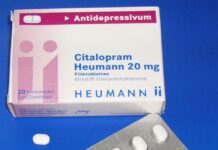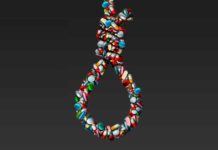Major Review Finds Antidepressants Ineffective, Potentially Harmful for Children and Teens
In a large review study published this week in The Lancet, researchers assessed the effectiveness and potential harms of fourteen different antidepressants for their use in children and adolescents. The negative results, familiar to MIA readers, are now making major headlines.
Correction: No “Charges” Against Former FDA Commissioner Margaret Hamburg
Our headline on an Around the Web item posted on June 8 stating that the former head of the FDA, Margaret Hamburg, had been "charged"...
“Tasty and Easy to Take, A New ADHD Drug Alarms Some Psychiatrists”
For STAT, Meghana Kashavan reports on a new, candy-flavored, chewable, fruity, amphetamine drug on the market for children diagnosed with ADHD. “It’s a move...
Undisclosed Financial Conflicts Endemic in Clinical Practice Guidelines
While there has been a recent push to account for financial conflicts of interest in medical research, less attention has been paid to organizations...
Despite Official Recommendations, Young Children Are Still Receiving Drugs Instead of Therapy for ‘ADHD’
In 2011 the American Academy of Pediatrics (AAP) issued guidelines recommending therapy over stimulant drugs as the primary treatment for children diagnosed with ‘ADHD.’ New research from the CDC reveals, however, that children between ages 2 and 5 are still being prescribed medications before receiving the recommended therapy or psychological services. Overall, the researchers found that 75% of these children are being prescribed “ADHD’ drugs while no more than 55% receive psychological treatments. Incredibly, among children on private insurances, the percentage of children receiving psychological services for ‘ADHD’ showed no increase following the 2011 recommendations.
Researcher Urges Caution When Applying Genetics to Psychiatry
In a review editorial for the journal Psychotherapy and Psychosomatics, neurobiology researcher Steven Dubovsky from the University at Buffalo argues against the adoption of...
Illness Inflation: Expanded Medical Definitions Create More Patients
The Milwaukee Journal Sentinel has issued a watchdog report titled “Illness Inflation” that examines how new medical conditions are often the product of industry...
“Bayer and Monsanto: A Marriage Made in Hell”
For CounterPunch, Martha Rosenberg and Ronnie Cummins comment on the announcement that Bayer has placed a bid to buy Monsanto. “Bayer and Monsanto both...
“Lawmakers Accuse HHS of Delaying FDA Guidelines for Off-Label Marketing”
Ed Silverman reports for STAT’s Pharmalot that high-ranking congressmen are accusing the Department of Health and Human Services of deliberately delaying new guidelines on...
Does Your Child Have ‘ADHD’? It Might Depend On Your Doctor
A study published in the journal Pediatrics reveals large differences from one pediatrician to the next when it comes to diagnosing and prescribing drugs for ‘ADHD.’ The researchers found that the percentage of children being diagnosed with ‘ADHD’ varied from as high as 16% of patients at some offices to as little as 1% of patients at others. The data also revealed significant but lower variability in the pediatric diagnosis of anxiety and depression.
Study Finds Racial Differences in Psychiatric Diagnosis and Treatment
Black patients are almost twice as likely as their white counterparts to be diagnosed with schizophrenia while whites are significantly more likely to receive a diagnosis of anxiety or depression, according to a recent study published in the journal Psychiatric Services. The researchers also found that the likelihood of receiving psychotherapy for any diagnosis (34%), regardless of race or ethnicity, was much lower than the likelihood of receiving a psychotropic medication (73%).
“The Hidden Harms of Antidepressants”
In a new article for Scientific American, Diana Kwon reports on how the true risks for suicide and aggression in children and teens taking...
Mental Health Treatments Top List of US Healthcare Spending
According to new research, the United States spends over 200 billion annually on treatment and hospitalization for mental health issues, exceeding spending on heart...
Coyne Covers Citalopram Controversy
In his “Mind the Brain” blog for PLOS, well-known researcher James Coyne reviews the controversy surrounding the latest case of a fraudulently reported study...
“Why We Shouldn’t Trade a Weakened FDA for More Medical Research Funds”
Ed Silverman at STAT reports that Congress has linked increased research funding to “fast-track” approval procedures. “By linking the extra funds to speedier approvals,...
Interview: Researchers Deconstruct Ghostwritten Industry Trial for Antidepressant
Researchers, Jon Jureidini, Jay Amsterdam and Leemon McHenry, have taken a closer look at the data from a randomized control trial of citalopram (Celexa) that was ghostwritten and then used by the manufacturers to support claims of the drug’s efficacy and safety in the treatment of child and adolescent depression. To get the background on this story, we connected with Dr. Leemon McHenry, an investigator in this study and a lecturer in philosophy at California State University, Northridge.
Report from the Parliament: Can Psychiatry At Least Be Curious?
In the past six years, I have had the opportunity to speak at several conferences or meetings that I felt had particular potential to stir some political activity that would challenge current psychiatric practices, and one of those events was the meeting convened in the U.K.’s Parliament on May 11th, which had this title for the day: Rising Prescriptions, Rising Mental Health Disability: Is There a Link?
Antidepressants Do Not Prevent Suicides, May Increase Risk
When the CDC released data revealing an increasing suicide rate in the US, some experts, speaking to major media outlets, speculated that the increase...
“Public Wary of Faster Approvals of New Drugs, STAT-Harvard Poll Finds”
According to a new STAT-Harvard poll, the majority of Americans oppose new legislation that would speed up the approval of new drugs and medical...
“Another Study Finds Link Between Pharma Money and Brand-name Prescribing”
New findings from Harvard Medical School reveal that Pharma industry payments to physicians in Massachusetts are associated with higher rates of prescribing brand-name drugs that treat...
“‘You Want a Description of Hell?’ OxyContin’s 12-Hour Problem”
A new LA Times investigation finds that Purdue Pharma’s claims that OxyContin, a chemical cousin of heroin, could relieve pain for twelve hours led some...
FDA Warns About New Impulse-Control Problems Associated With Abilify
Yesterday, the US Food and Drug Administration (FDA) released a warning that the antipsychotic drug aripiprazole or Abilify is associated with compulsive and uncontrollable...
Restoring Study 329: Letter to BMJ
When we set out to restore GSK’s misreported Study 329 of paroxetine for adolescent depression under the RIAT initiative, we had no idea of the magnitude of the task we were undertaking. After almost a year, we were relieved to finally complete a draft and submit it to the BMJ, who had earlier indicated an interest in publishing our restoration. But that was the beginning of another year of peer review that we believed went beyond enhancing our paper and became rather an interrogation of our honesty and integrity. Frankly, we were offended that our work was subject to such checks when papers submitted by pharmaceutical companies with fraud convictions are not.
Lancet Editorial Points to “Trouble with Psychiatry Trials”
While clinical trials make up the “bedrock of evidence-based medicine” in other specialties, psychiatry faces a number of both ethical and scientific problems related to its use of randomized control trials. According to a new editorial in The Lancet Psychiatry, the field of psychiatry research has particular problems with ethical issues in recruitment, inaccurate classification systems, and controversial placebo comparisons, and then, once the studies are finished, it often remains unclear what the “outcomes actually mean for people’s lives.”
“What Drug Ads Don’t Say”
For the New York Times, Cornell psychiatrist Richard Friedman proposes new regulations to make direct-to-consumer drug ads reveal the relative price and effectiveness information that...











